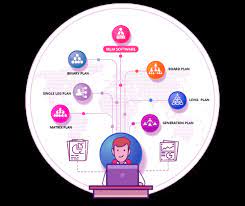Unlocking Success: The Power of MLM Software Development Solutions
The Importance of MLM Software Development
Multi-Level Marketing (MLM) is a popular business model that relies on a network of distributors to grow the business and sell products or services. To effectively manage the complexities of an MLM business, specialized software solutions are essential.
Benefits of MLM Software Development
MLM software development plays a crucial role in automating various aspects of an MLM business, making it more efficient and scalable. Here are some key benefits:
- Business Management: MLM software helps in managing distributor networks, tracking sales, commissions, and bonuses.
- Automation: Streamlining repetitive tasks such as order processing, inventory management, and payment processing leads to increased productivity.
- Customization: Tailoring the software to meet specific business requirements ensures optimal performance and seamless operation.
- Data Analysis: Advanced reporting and analytics features provide valuable insights into sales trends, distributor performance, and overall business growth.
- Security: Implementing robust security measures protects sensitive data and ensures compliance with industry regulations.
Choosing the Right MLM Software Development Partner
When selecting a partner for MLM software development, it is essential to consider their experience, expertise, and track record in developing customized solutions for MLM businesses. Look for a team that understands the unique challenges of the MLM industry and can deliver a solution that aligns with your business goals.
In Conclusion
In today’s competitive market, having reliable MLM software is crucial for the success of your multi-level marketing business. By investing in tailored software solutions designed to meet your specific needs, you can streamline operations, enhance productivity, and drive growth in your MLM venture.
Understanding MLM Software Development: Key FAQs Answered
- What is mean by MLM software?
- What is MLM technology?
- What’s MLM stand for?
- How do I create an MLM software?
- What is MLM software development?
- What does the MLM stand for?
What is mean by MLM software?
MLM software, short for Multi-Level Marketing software, refers to specialized technology solutions designed to facilitate and streamline the operations of multi-level marketing businesses. This software is tailored to manage various aspects of an MLM business, such as distributor networks, sales tracking, commission calculations, and bonus structures. By automating key processes and providing valuable insights through reporting and analytics features, MLM software plays a crucial role in optimizing the efficiency and performance of MLM companies. It serves as a centralized platform for managing all facets of the business, enabling smoother operations and enhanced productivity.
What is MLM technology?
MLM technology, short for Multi-Level Marketing technology, refers to the specialized software and digital tools designed to support and automate the operations of a multi-level marketing business. This technology encompasses a range of features such as managing distributor networks, tracking sales and commissions, processing orders, analyzing data, and ensuring security compliance. MLM technology plays a crucial role in streamlining business processes, enhancing efficiency, and providing valuable insights to MLM companies for better decision-making and growth strategies. By leveraging MLM technology effectively, businesses can optimize their operations and drive success in the competitive world of network marketing.
What’s MLM stand for?
MLM stands for Multi-Level Marketing. It is a business model where individuals act as distributors for a company’s products or services and earn income through direct sales and by recruiting a network of distributors. In MLM, distributors can earn commissions not only on their own sales but also on the sales made by the distributors they recruit into their downline. This hierarchical structure of compensation sets MLM apart from traditional direct selling models and has both supporters and critics within the business community.
How do I create an MLM software?
Creating MLM software requires a strategic approach and specialized expertise in software development. To develop MLM software, you need to outline the specific features and functionalities required for managing distributor networks, tracking sales, calculating commissions, and more. It involves designing a user-friendly interface, implementing secure payment gateways, and integrating data analytics tools for performance monitoring. Collaborating with experienced developers who understand the intricacies of MLM business models is crucial to ensure the successful creation of customized MLM software that meets your unique requirements and aligns with your business objectives.
What is MLM software development?
MLM software development refers to the process of creating specialized software solutions tailored to meet the unique needs of Multi-Level Marketing (MLM) businesses. This type of software is designed to automate various aspects of an MLM business, such as managing distributor networks, tracking sales, commissions, bonuses, and other essential functions. By developing MLM software, businesses can streamline operations, improve efficiency, and gain valuable insights through advanced reporting and analytics features. Choosing the right MLM software development partner is crucial to ensure that the software aligns with the specific requirements and objectives of the MLM business.
What does the MLM stand for?
MLM stands for Multi-Level Marketing. It is a business model where individuals can earn income not only through their own sales efforts but also by recruiting and managing a network of distributors. In MLM, participants typically earn commissions on the sales made by their downline (those they have recruited) as well as their own sales. This structure creates multiple levels of compensation, hence the term “multi-level marketing.” MLM businesses often promote products or services through a network of independent distributors, offering them the opportunity to build their own business within the company’s framework.



